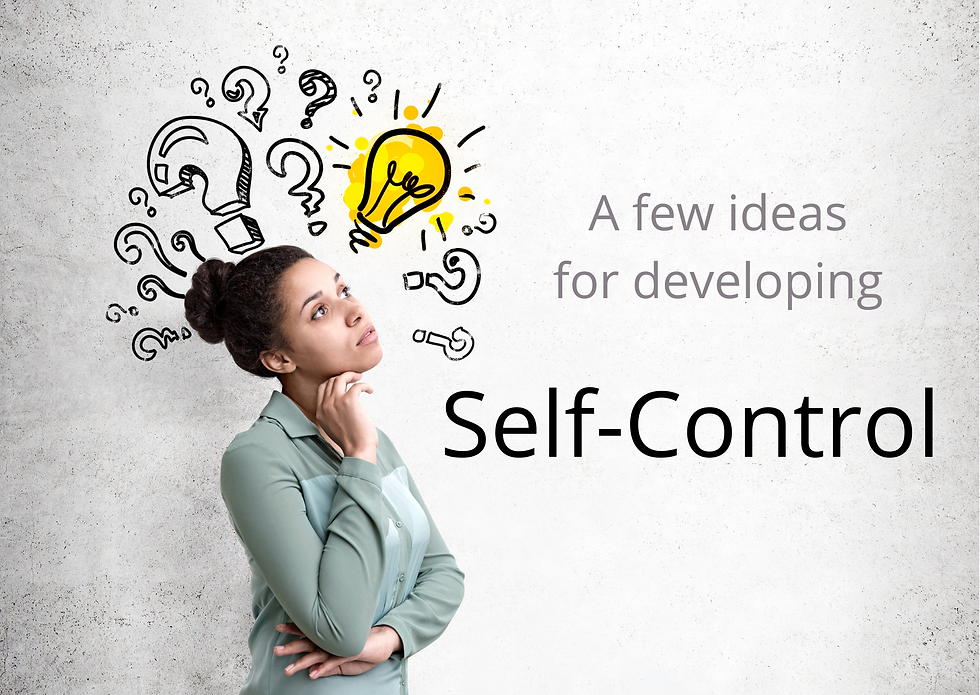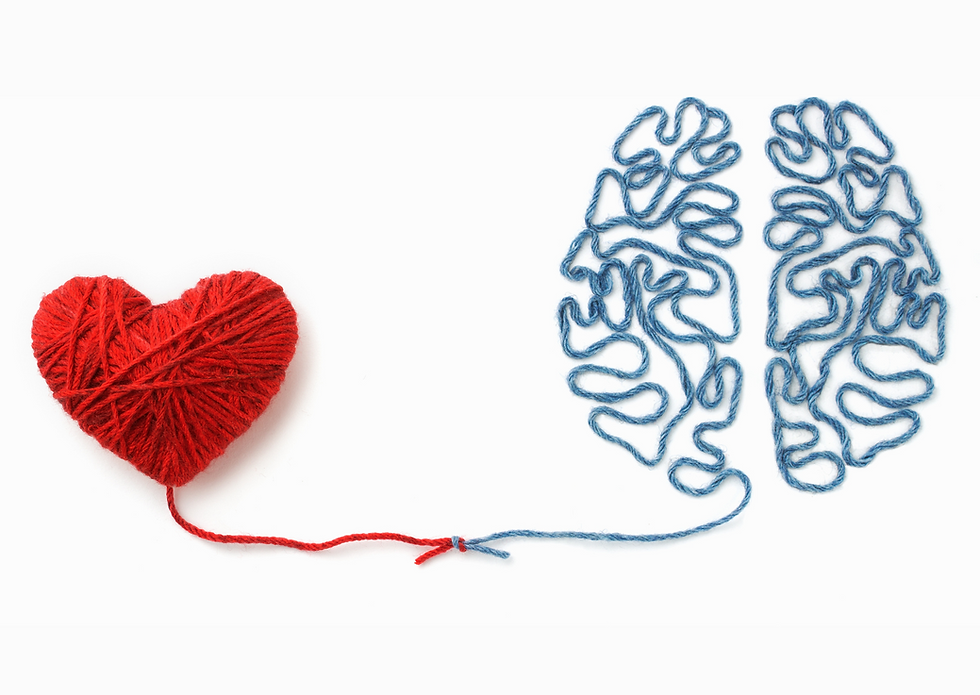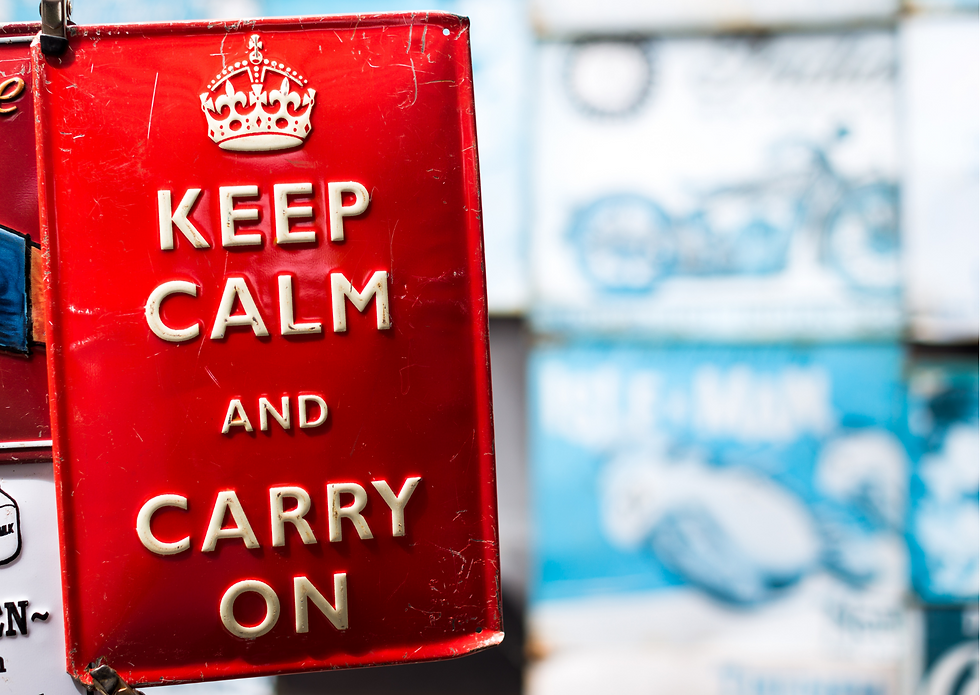Developing Self-Control
- Mary Ely

- Oct 19, 2022
- 5 min read
RocheMartin defines Emotional Intelligence by a set of 10 competencies and this is one in a series of blogs covering each one.

Self-Control means you're able to let go of negative emotions quickly, so you can think logically, focus on what needs to be done and move forward in an organised way
The 3 components of Self-Control are
Calmness
Being able to let go of or stall negative emotions so you can stay calm and keep a consistent mood, whatever is going on.
Rational minded
Able to stay focused and not let your mind be hijacked by negative emotions.
Disciplined
Going about things in a logical, orderly manner and being accountable for what you do.
To find out more and why it's so important, have a look at this blog.
A few ideas to increase your Self-Control

....all wrapped up into one...so you can learn to recognise and interrupt your automatic responses and choose what to do next rather than being at the mercy of your emotions...
Use my 4A model for change:
Analyse, Acknowledge, Alternatives, Action
This model can be applied in the moment
AND it's particularly effective if you use it to plan in advance.

Acknowledge
The first step is to acknowledge how you are feeling.
Noticing tends to be the first step for any change. What's the trigger point for interrupting your automatic pattern and introducing an element of CHOICE?
When it comes to high emotions, acknowledging them is part of that. Pay attention to the emotion and name it. What is the mix of emotions that you are feeling?
"I notice that I'm feeling angry and hurt"
Even doing that starts to put a bit of distance between you and the emotion and may be enough to stop you being totally hijacked by it. You can even add more distance....
"I notice that I'm noticing that I'm feeling angry and hurt"
The emotion (and the voice inside your head) is a bit like a frustrated child. It needs to know you've paid attention to it and listened to what it has to say otherwise it'll have a full-blown tantrum to really make sure you do.
Fighting against the emotion or trying to ignore it will make it worse - for example, getting annoyed about feeling angry and hurt, or bottling it up.
So just acknowledge it and then really pay attention to it...which is the next step...
Analyse
What specifically is causing you to feel the emotion?

The real trick for developing Self-Control is to do some preparation in advance.
Understand your normal triggers, learn from them and develop mental strategies (alternatives to just staying in the emotion) for when they show up, so you can diffuse them quickly.
Working with a coach is the quickest and easiest way to develop these strategies as it keeps you focused on the task (it's really easy to wander off in your head) and stops you from being limited by your own thinking.
The first part of that is Analysis - what specifically tends to make you feel angry, anxious, overwhelmed, hurt, sad, fed up, guilty etc...what is making you feel that way now?
Alternatives
At this point (which may only take a fraction of a second), you've noticed how you're feeling and have a good idea about what's causing it.
Even doing that can interrupt your automatic pattern. Stop you from being dumped in a negative emotion without any hope of regaining control of your head (and emotions).

So now, what are your alternatives?
How could you challenge your current thinking so you can feel differently and act differently? What could you say to yourself?
What could you do to feel differently? e.g. take a time out, take some deep breathes etc
What alternatives have you thought of in advance that you could apply right now?
The next step is to choose and apply one or more of those alternatives.
In other words, to exercise your power of choice and take...
Action
My advice is to throw everything you've got at the emotion so you can
keep calm and carry on
AND there may be times when the choice you make is to do nothing. When you choose to be hijacked by the emotion. Stay in it and lose the power of logical thought.
This is the opposite of having self-control and sometimes it's the choice we make, but make it a conscious choice rather than your automatic reaction.
And aim to make this choice your exception rather than your normal rule!
If this is your choice, make sure you give yourself a time-out. Set a deadline for when you will STOP and go through the 4A model to find another alternative to take action on.

So
the first action is to choose an alternative that will allow you to diffuse the emotion - i.e. restore calmness
the second is to decide what you will do next, which will now be possible as your brain will be under your control again i.e. you can be rational minded
and the next is to do what you've decided i.e. be disciplined
and the final action is to reflect, review and learn. Is the choice you made one that you want to repeat or do you need to experiment with a few adjustments or a different alternative next time?
Applying the 4 A model again can help with that second action too
Acknowledge - something triggered your emotion, so...
Analyse - what was it?
Alternatives - what could you do about it?
Action - what will you do about it?
AND because of the way we learn,
if you apply your alternatives to staying in the emotion often enough, those alternatives will become your revised automatic processing
...so you will have more self-control more often...without having to think about it.
Want some more help? then check out my blogs that cover negative emotions in more detail
The general alternatives that tend to work for me and some specifics around anger/hurt, fear/anxiety, guilt, sadness, stress and overwhelm.
Coaching and Therapy
Both help you explore what triggers your emotions and how you can change your habitual responses to have more Self-Control.
Coaching is an efficient, effective, engaging, empowering and enjoyable way to build any of the Emotional Intelligence competencies.
Helping you to develop, refine and embed your own personalised strategies for each competency.
Time Line Therapy and the emotional spring clean process is a quick and painless way to clear out the negative emotion from your past (which is a lovely feeling) and discover and embed your own set of guidelines for how to quickly release negative emotions when they appear in your future. For more information, visit the Clear the Past, Create the future page of my website.

If you’re interested in understanding your level of emotional intelligence using one of the RocheMartin assessments or would like to explore coaching for developing components of it like Self-Confidence, you can book a free call here.
And if you'd like to try out my monthly emails that provide a roundup of my blogs as well as other insights, you can sign up here.





Comments